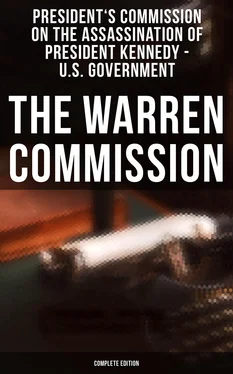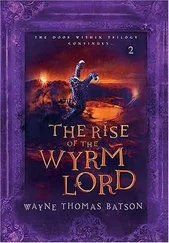Mr. Rankin. Did you feel that you were becoming more impatient with all of these things that your husband was doing, the Fair Play for Cuba and the Walker incident, and then this fictitious name business?
Mrs. Oswald. Yes, of course. I was tired of it.
Every day I was waiting for some kind of a new surprise. I couldn't wait to find out what else would he think of.
Mr. Rankin. Did you discuss that with your husband at all?
Mrs. Oswald. Yes, of course.
Mr. Rankin. What did you say about that?
Mrs. Oswald. I said that no one needed anything like that, that for no reason at all he was thinking that he was not like other people, that he was more important.
Mr. Rankin. And what did he say?
Mrs. Oswald. He would seem to agree, but then would continue again in two or three days.
Mr. Rankin. Did you sense that he was not intending to carry out his agreement with you to not have another Walker incident or anything like that?
Mrs. Oswald. I generally didn't think that Lee would repeat anything like that. Generally, I knew that the rifle was very tempting for him. But I didn't believe that he would repeat it. It was hard to believe.
Mr. Rankin. I wasn't clear about when Mrs. Paine thought that your husband might have been in the garage and had the light on. Can you give us any help on the time of day that she had in mind?
Mrs. Oswald. In the morning she thought about it. But she didn't attach any significance to it at that time. It was only after the police had come that this became more significant for her.
Mr. Rankin. So she thought it was in the morning after he got up from his night's rest that he might have gone to the garage, turned on the light?
Mrs. Oswald. In my opinion, she thought that it was at night, or during the evening that he had been in the garage and turned on the light. At least that is what she said to me. I don't know.
Mr. Rankin. Did she indicate whether she thought it was before he went to bed at 9 o'clock?
Mrs. Oswald. I don't know. At first it seems it wasn't nine, it was perhaps ten o'clock when Lee went to bed. And first, Ruth went to her room and then Lee went. He was there after her.
Mr. Rankin. So he might have been in the garage sometime between 9 and 10? Was that what you thought?
Mrs. Oswald. Yes. But I think that he might have even been there in the morning and turned on the light.
Mr. Rankin. On this evening when you were angry with him, had he come home with the young Mr. Frazier that day?
Mrs. Oswald. Yes.
Mr. Rankin. When was the last time that you had noticed the rifle before that day?
Mrs. Oswald. I said that I saw—for the first and last time I saw the rifle about a week after I had come to Mrs. Paine.
But, as I said, the rifle was wrapped in a blanket, and I was sure when the police had come that the rifle was still in the blanket, because it was all rolled together. And, therefore, when they took the blanket and the rifle was not in it, I was very much surprised.
Mr. Rankin. Did you ever see the rifle in a paper cover?
Mrs. Oswald. No.
Mr. Rankin. Could you describe for the Commission the place in the garage where the rifle was located?
Mrs. Oswald. When you enter the garage from the street it was in the front part, the left.
Mr. Rankin. By the left you mean left of the door?
Mrs. Oswald. It is an overhead door and the rifle was to the left, on the floor.
It was always in the same place.
Mr. Rankin. Was there anything else close to the rifle that you recall?
Mrs. Oswald. Next to it there were some—next to the rifle there were some suitcases and Ruth had some paper barrels in the garage where the kids used to play.
Mr. Rankin. The way the rifle was wrapped with a blanket, could you tell whether or not the rifle had been removed and the blanket just left there at any time?
Mrs. Oswald. It always had the appearance of having something inside of it. But I only looked at it really once, and I was always sure the rifle was in it. Therefore, it is very hard to determine when the rifle was taken. I only assumed that it was on Thursday, because Lee had arrived so unexpectedly for some reason.
Mr. Rankin. Did you believe that the reason for his coming out to see you Thursday was to make up?
Mrs. Oswald. I think there were two reasons. One was to make up with me, and the other to take the rifle. This is—this, of course, is not irreconcilable.
Mr. Rankin. But you think he came to take the rifle because of what you learned since. Is that it?
Mrs. Oswald. Yes, of course.
Mr. Rankin. Before this incident about the fictitious name, were you and your husband getting along quite well?
Mrs. Oswald. Yes.
Mr. Rankin. Did he seem to like his job at the depository?
Mrs. Oswald. Yes, because it was not dirty work.
Mr. Rankin. Had he talked about getting any other job?
Mrs. Oswald. Yes. When he went to answer some ads, he preferred to get some work connected with photography rather than this work. He liked this work relatively speaking—he liked it. But, of course, he wanted to get something better.
Mr. Rankin. Did you like the photographic work?
Mrs. Oswald. Yes. It was interesting for him. When he would see his work in the newspaper he would always point it out.
Mr. Rankin. He had a reference in his notebook to the word "Microdot". Do you know what he meant by that?
Mrs. Oswald. No.
Mr. Rankin. How did your husband get along with Mrs. Paine?
Mrs. Oswald. He was polite to her, as an acquaintance would be, but he didn't like her. He told me that he detested her—a tall and stupid woman. She is, of course, not too smart, but most people aren't.
Mr. Rankin. Did he ever say anything to indicate he thought Mrs. Paine was coming between him and you?
Mrs. Oswald. No.
Mr. Rankin. Did Mrs. Paine say anything about your husband?
Mrs. Oswald. She didn't say anything bad. I don't know what she thought. But she didn't say anything bad.
Perhaps she didn't like something about him, but she didn't tell me. She didn't want to hurt me by saying anything.
Mr. Rankin. I have understood from your testimony that you did not really care to go to Russia but your husband was the one that was urging that, and that is why you requested the visa, is that correct?
Mrs. Oswald. Yes.
Mr. Rankin. And later he talked about not only you and your child going, but also his going with you, is that right?
Mrs. Oswald. Yes.
Mr. Rankin. Do you know what caused him to make that change?
Mrs. Oswald. At one time—I don't remember whether he was working at that time or not—he was very sad and upset. He was sitting and writing something in his notebook. I asked him what he was writing and he said, "It would be better if I go with you."
Then he went into the kitchen and he sat there in the dark, and when I came in I saw that he was crying. I didn't know why. But, of course, when a man is crying it is not a very pleasant thing, and I didn't start to question him about why.
Mr. Rankin. Did he say to you that he didn't want you to leave him alone?
Mrs. Oswald. Yes.
Mr. Rankin. Did you at that time say anything to him about your all staying in this country and getting along together?
Mrs. Oswald. I told him, of course, that it would be better for us to stay here. But if it was very difficult for him and if he was always worried about tomorrow, then perhaps it would be better if we went.
Mr. Rankin. On the evening of the 21st, was anything said about curtain rods or his taking curtain rods to town the following day?
Mrs. Oswald. No, I didn't have any.
Mr. Rankin. He didn't say anything like that?
Mrs. Oswald. No.
Mr. Rankin. Did you discuss the weekend that was coming up?
Читать дальше












